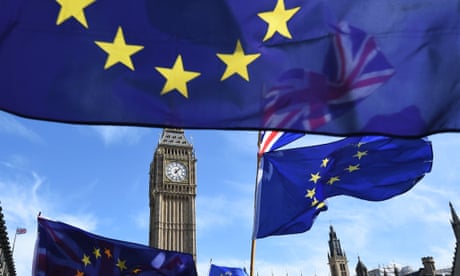“It’s yours against mine.” That’s how Wolfgang Schäuble, Germany’s finance minister, put it to me during our first encounter in early 2015 – referring to our respective democratic mandates.
A little more than two years later, Theresa May is trying to arm herself with a clear democratic mandate ostensibly to bolster her negotiating position with European powerbrokers – including Schäuble – and to deliver the optimal Brexit deal.
Already, the Brussels-based commentariat are drawing parallels: “Brits fallen for Greek fallacy that domestic vote gives you stronger position in Brussels. Other countries have voters too,” tweeted Duncan Robinson, Brussels correspondent of the Financial Times. “Yep,” tweeted back Miguel Roig, the Brussels correspondent of Spanish financial daily Expansión. “Varoufakis’ big miscalculation was to think that he was the only one in the Eurogroup with a democratic mandate.”
In truth, Brussels is a democracy-free zone. From the EU’s inception in 1950, Brussels became the seat of a bureaucracy administering a heavy industry cartel, vested with unprecedented law-making capacities. Even though the EU has evolved a great deal since, and acquired many of the trappings of a confederacy, it remains in the nature of the beast to treat the will of electorates as a nuisance that must be, somehow, negated. The whole point of the EU’s inter-governmental organisation was to ensure that only by a rare historical accident would democratic mandates converge and, when they did, never restrain the exercise of power in Brussels.
In June 2016, Britain voted, for better or for worse, for Brexit. May suddenly metamorphosed from a soft remainer to a hard Brexiteer. In so doing she is about to fall prey to an EU that will frustrate and defeat her, pushing her into either a humiliating climb-down or a universally disadvantageous outcome. When the Brussels-based group-thinking commentariat accuse Britain’s prime minister, without a shred of evidence, of overestimating the importance of a strong mandate, we need to take notice, for it reveals the determination of the EU establishment to get its way, as it did when I arrived on its doorstep, equipped with my mandate.
When I first went to Brussels and Berlin, as Greece’s freshly elected finance minister, I brought with me a deep appreciation of the clash of mandates. I said as much in a joint press conference with Schäuble in 2015, pledging that my proposals for an agreement between Greece and the EU would be “aimed not at the interest of the average Greek but at the interest of the average European”. A few days later, in my maiden speech at the Eurogroup of eurozone finance ministers, I argued: “We must respect established treaties and processes without crushing the fragile flower of democracy with the sledgehammer that takes the form of statements such as ‘Elections do not change anything’.” May will, I presume, go to Brussels with a similar appreciation.
When Schäuble welcomed me with his “it is my mandate against yours” doctrine, he was honouring a long EU tradition of neglecting democratic mandates in the name of respecting them. Like all dangerous hypotheses, it is founded on an obvious truth: the voters of one country cannot give their representative a mandate to impose upon other governments conditions that the latter have no mandate, from their own electorate, to accept. But, while this is a truism, its incessant repetition by Brussels functionaries and political powerbrokers, such as Angela Merkel and Schäuble himself, is intended to convert it surreptitiously into a very different notion: no voters in any country can empower their government to oppose Brussels.
There is a long EU tradition of neglecting democratic mandates in the name of respecting them
For all their concerns with rules, treaties, processes, competitiveness, freedom of movement, terrorism etc, only one prospect truly terrifies the EU’s deep establishment: democracy. They speak in its name to exorcise it, and suppress it by six innovative tactics, as May is about to discover.
The EU runaround
Henry Kissinger famously quipped that when he wanted to consult Europe, he did not know whom to call. In my case it was worse. Any attempt to enter into a meaningful discussion with Schäuble was blocked by his insistence that I “go to Brussels” instead. Once in Brussels, I soon discovered that the commission was so divided as to make discussions futile. In private talks, Commissioner Moscovici would agree readily and with considerable enthusiasm with my proposals. But then his deputy in the so-called Eurogroup Working Group, Declan Costello, would reject all these ideas out of hand.
The uninitiated may be excused for thinking that this EU runaround is the result of incompetence. While there is an element of truth in this, it would be the wrong diagnosis. The runaround is a systemic means of control over uppity governments. A prime minister, or a finance minister, who wants to table proposals that the deep establishment of the EU dislike is simply denied the name of the person to speak to or the definitive telephone number to call. As for its apparatchiks, the EU runaround is essential to their personal status and power.
Picking opponents
From my first Eurogroup, its president, Jeroen Dijsselbloem, the Dutch finance minister, began an intensive campaign to bypass me altogether. He would phone Alexis Tsipras, my prime minister, directly – even visiting him in his hotel room in Brussels. By hinting at a softer stance if Tsipras agreed to spare him from having to deal with me, Dijsselbloem succeeded in weakening my position in the Eurogroup – to the detriment, primarily, of Tsipras.
From my first Eurogroup, its president, Jeroen Dijsselbloem, the Dutch finance minister, began an intensive campaign to bypass me altogether. He would phone Alexis Tsipras, my prime minister, directly – even visiting him in his hotel room in Brussels. By hinting at a softer stance if Tsipras agreed to spare him from having to deal with me, Dijsselbloem succeeded in weakening my position in the Eurogroup – to the detriment, primarily, of Tsipras.
The Swedish national anthem routine
On the assumption that good ideas encourage fruitful dialogue and can be the solvents of impasse, my team and I worked hard to put forward proposals based on serious econometric work and sound economic analysis. Once these had been tested on some of the highest authorities in their fields, from Wall Street and the City to top-notch academics, I would take them to Greece’s creditors in Brussels, Berlin and Frankfurt. Then I would sit back and observe a symphony of blank stares. It was as if I had not spoken, as if there was no document in front of them. It would be evident from their body language that they denied the very existence of the pieces of paper I had placed before them. Their responses, when they came, would be perfectly independent of anything I had said. I might as well have been singing the Swedish national anthem. It would have made no difference.
On the assumption that good ideas encourage fruitful dialogue and can be the solvents of impasse, my team and I worked hard to put forward proposals based on serious econometric work and sound economic analysis. Once these had been tested on some of the highest authorities in their fields, from Wall Street and the City to top-notch academics, I would take them to Greece’s creditors in Brussels, Berlin and Frankfurt. Then I would sit back and observe a symphony of blank stares. It was as if I had not spoken, as if there was no document in front of them. It would be evident from their body language that they denied the very existence of the pieces of paper I had placed before them. Their responses, when they came, would be perfectly independent of anything I had said. I might as well have been singing the Swedish national anthem. It would have made no difference.
The Penelope ruse
Delaying tactics are always used by the side that considers the ticking clock its ally. In Homer, Odysseus’ faithful wife, Penelope, fends off aggressive suitors in her husband’s absence by telling them that she will announce whom among them she will marry only after she has completed weaving a burial shroud for Laertes, Odysseus’ father. During the day she would weave incessantly but at night she would undo her work by pulling on a loose string.
In my negotiations in Brussels, the EU’s Penelope ruse consisted, primarily, of endless requests for data, for fact-finding missions to Athens, for information about every bank account held by every public organisation or company. And when they got the data, like the good Penelope, they would spend all night undoing the spreadsheets that they had put together during the day.
Truth reversal
While practising the Swedish national anthem and Penelope ruse tactics, the Brussels establishment utilised tweets, leaks and a campaign of disinformation involving key nodes in the Brussels media network to spread the word that I was the one wasting time, arriving at meetings empty-handed; either with no proposals at all or with proposals that lacked quantification, consisting only of empty ideological rhetoric.
Sequencing
The prerequisite for Greece’s recovery was, and remains, meaningful debt relief. No debt relief meant no future for us. My mandate was to negotiate, therefore, a sensible debt restructure. If the EU was prepared to do this, so as to get as much of their money back as possible, I was also prepared for major compromises. But this would require a comprehensive deal. But, no, Brussels and Berlin insisted that, first, I commit to the compromises they wanted and then, much later, we could begin negotiations on debt relief. The point-blank refusal to negotiate on both at once is, I am sure, a colossal frustration awaiting May when she seeks to compromise on the terms of the divorce in exchange for longer-term free trade arrangements.
So what can Theresa May do?
The only way May could secure a good deal for the UK would be by diffusing the EU’s spoiling tactics, while still respecting the Burkean Brexiteers’ strongest argument, the imperative of restoring sovereignty to the House of Commons. And the only way of doing this would be to avoid all negotiations by requesting from Brussels a Norway-style, off-the-shelf arrangement for a period of, say, seven years.
The benefits from such a request would be twofold: first, Eurocrats and Europhiles would have no basis for denying Britain such an arrangement. (Moreover, Schäuble, Merkel and sundry would be relieved that the ball is thrown into their successors’ court seven years down the track.) Second, it would make the House of Commons sovereign again by empowering it to debate and decide upon in the fullness of time, and without the stress of a ticking clock, Britain’s long-tem relationship with Europe.
The fact that May has opted for a Brexit negotiation that will immediately activate the EU’s worst instincts and tactics, for petty party-political reasons that ultimately have everything to do with her own power and nothing to do with Britain’s optimal agreement with the EU, means only one thing: she does not deserve the mandate that Brussels is keen to neutralise.



